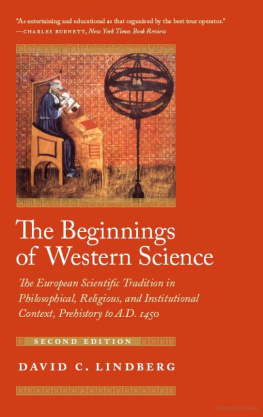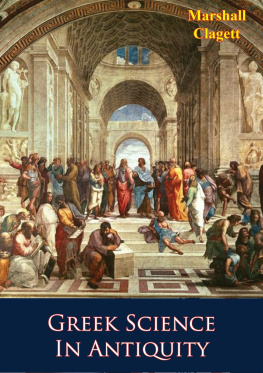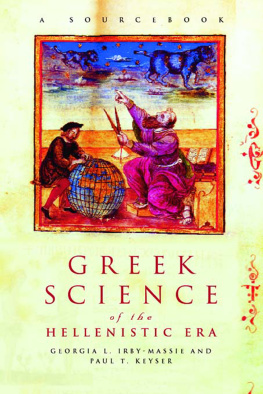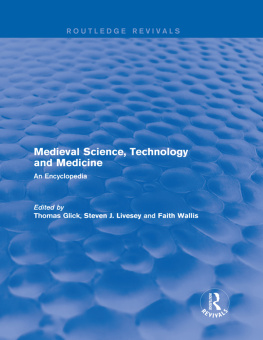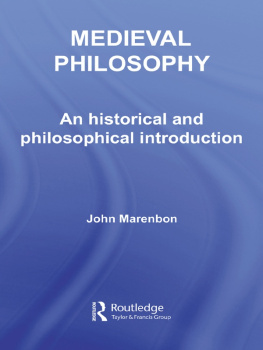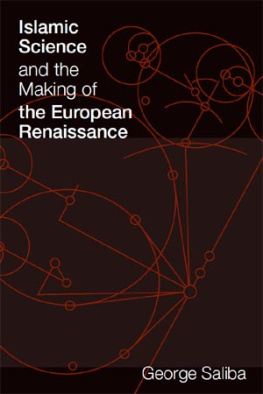Table of Contents
DAVID C. LINDBERG is the Hilldale Professor Emeritus of the History of Science at the University of Wisconsin-Madison and past president of the History of Science Society. He is the author or editor of many books, including, with coeditor Ronald L. Numbers, When Science and Christianity Meet , also published by the University of Chicago Press.
The University of Chicago Press, Chicago 60637
The University of Chicago Press, Ltd., London
1992, 2007 by The University of Chicago
All rights reserved. Published 2007
Printed in the United States of America
I6 I5 I4 I3 I2 II I0 09 08 07 I 2 3 4 5
ISBN-13: 978-0-226-48205-7 (paper) ISBN-10: 0-226-48205-7 (paper)
Library of Congress Cataloging-in-Publication Data
Lindberg, David C.
The beginnings of western science : the European scientific tradition in philosophical,
religious, and institutional context, prehistory to A.D. 1450 / David C. Lindberg.2nd
ed.
p. cm.
Includes bibliographical references and index.
ISBN-I3: 978-0-226-48205-7 (pbk. : alk. paper)
ISBN-I0: 0-226-48205-7 (pbk. : alk. paper) 1. Science, AncientHistory. 2. Science,
MedievalHistory. I. Title.
Q124.95.L55 2007
509.4dc22
2007029485
The paper used in this publication meets the minimum
requirements of the American National Standard for
Information SciencesPermanence of Paper for Printed
Library Materials, A NSI Z39.48-I992.
To Greta, Chris, John, Erik, Liana, Annie, and Davey, who have brought so much joy to my life.
Preface
The original edition of this book drew on two decades of experience teaching the history of ancient and medieval science to university undergraduates. Now, with another two decades of teaching experience under my belt and an array of recent scholarship on my bookshelves, I have been given the privilege of producing a revised version. In many ways this is the same book: same chapter titles, mostly the same illustrations, and basically the same storybut with many improvements, large and small. The chapter on Islamic science has been entirely rewrittenaltered in both substance and presentation, to reveal the magnitude and sophistication of the medieval Islamic scientific achievement. The concluding chapter, which assesses the medieval contribution to scientific developments of the sixteenth and seventeenth centuries, has also been entirely rewritten. The section on Byzantine science has been enlarged. In the last couple of decades I have acquired a much sharper awareness of the importance of the Mesopotamian contribution to astronomy and have added material accordingly. Medieval alchemy and medieval astrology, generally viewed by the public as pseudoscience, have been given a larger place in the story, thanks to illuminating research by John North and William Newman, which yields some surprises about the relationship of medieval astrology and alchemy to the broader scientific enterprise.
These revisions are just a few of the many improvements. I think it unlikely that a single page of the book has managed to escape the process of revision unaltered. Ive had the pleasure of copyediting my own prose, attempting to breathe life into a dead sentence, retracting a claim, softening a judgment, clarifying an explanation, correcting an error. My hope and expectation is that this book, in its second incarnation, will continue to reach a general audience, including students, with the startling news that the ancient and medieval periods were the scene of impressive scientific achievements, which provided a solid foundation for scientific developments of the sixteenth and seventeenth centuries and beyond.
Although I have written with a general audience in mind, I have not shrunk from opportunities to resolve contemporary scholarly disputes when the occasions present themselves. Passages in which I lecture the reader on the proper ways of doing history and warn against a variety of perils will be immediately recognized as the products of long classroom experience; and it is my hope that this book will continue to prove itself suitable for classroom use. But I believe that it will also interest the general educated reader and scholars who do not specialize in the history of ancient and medieval science. No other book of which I am aware covers the same breadth of material, over the same chronological span, at the same level of presentation. In this edition, as in the first, I have more persistently attempted to place ancient and medieval science in philosophical, religious, and institutional (largely educational) context than have the authors of other surveys. And I am quite certain that no other survey of this material has paid as much serious attention to the religious context, without embarrassment and without an apologetic or polemical agenda.
Two remarks about endnotes and bibliography: First, I have used the notes not only for purposes of documentation and acknowledgment of scholarly debt, but also as an opportunity for a running bibliographical commentary, in which I suggest sources where the subject at hand may be fruitfully pursued. Second, I have enlarged the bibliography of this second edition to take into account recent scholarship, increasing the number of entries by about two hundred. In both the notes and bibliography, I have (with the student audience and the general reader in mind) emphasized English-language literature. Sources in foreign languages are included where it seems to me that there is nothing comparable in English.
Finally, nobody covers a subject as large as this without a great deal of help, and I am profoundly indebted to friends and colleagues who have done their best to instruct me in the intricacies of their various specialties and rescue me from confusion and error. I have not always been a compliant pupil, and some will still find in this book interpretations that they do not like. The preface to the first edition of this book contains a long list of scholars to whom I owe a continuing debt of gratitude for their contributions. For advice on portions of this revised version, it is a pleasure to thank Emilie Savage-Smith, A. Mark Smith, and especially my colleague and comrade-in-arms, Michael Shank. My wife, Greta, has been her usual loving, patient, supportive self, and I hope that completion of this revised edition convinces her that Ill finally bring order to my study and become available for yard work.
David Lindberg, October 2007
Science before the Greeks
WHAT IS SCIENCE?
The opinion that there was no science in the two thousand years covered by this book continues to be stated with considerable regularity and dogmatic fervor. If the claim is true, I have written a book about a nonexistent subjectno mean feat, but not my goal. This book proclaims in its title that it will portray the beginnings of Western science over the approximately three millennia ending about the year A.D. 1450. Was there truly such a thing as science in those times? And if the answer is affirmative, was there enough of it to merit book-length coverage?
Before we can answer these questions, we need a definition of sciencesomething that turns out to be surprisingly difficult to come by. There is, of course, the dictionary definition, according to which science is organized, systematic knowledge of the material world. But this proves to be so general as to be of little help. For example, do craft traditions and technology count for science, or are science and technology to be distinguished from one anotherthe former dedicated to theoretical knowledge, the latter to its application? If only theoretical knowledge counts as genuine science, we then need to decide which theories (or which kinds of theory) pass the test. Do astrology and parapsychology, both of which are chock full of theories, count as sciences?

